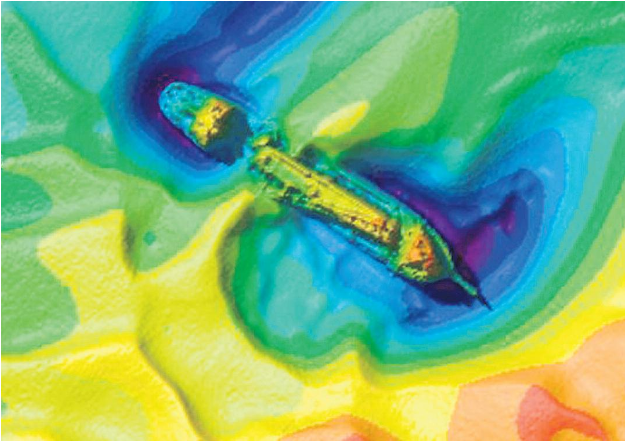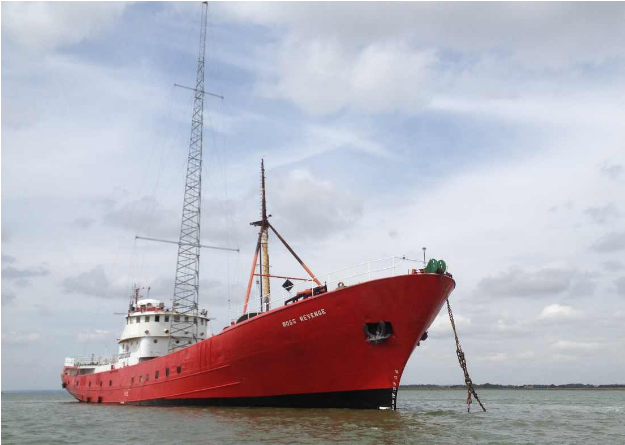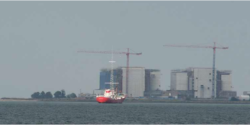The Blackwater Estuary is in the English county of Essex. Despite its closeness to Colchester, England’s oldest town, it is a remote and lonely stretch of water, just down the coast from the busy seaside resort of Clacton on Sea. The small village of Bradwell is an ideal location for a nuclear power station, forlorn and unloved. On some weekends, teams of volunteers head for Bradwell with their tool boxes; in July 2014, the nuclear power station welcomed the return of a famous and iconic neighbour, the Ross Revenge, which is now moored in the estuary adjacent to the power station.
The Ross Revenge, commissioned in 1960 for the Ross fishing company, was an Icelandic trawler supplying the UK market with fish. The vessel was involved in the “Cod Wars” of 1975-6 when she regularly featured on the UK’s TV news. Then the Ross company put her up for sale. She was eventually acquired by…
Radio Caroline, which started in 1964 broadcasting music all day on 199 metres (about 1506 kHz) MW, and quickly established a large audience for her broadcasts from a converted passenger vessel, the Frederica, renamed the MV Caroline. Flying a flag of convenience, the vessel broadcast from international waters off the Suffolk/Essex coast. “Pirate radio” had arrived in the UK. More stations followed, broadcasting from other ships or from disused wartime structures in the Thames Estuary.
During 1964 Radio Caroline acquired a second vessel, the Mi Amigo—previously known as the Bon Jour, which had broadcast pirate radio to Scandinavia—by merging with another pirate radio station called Radio Atlanta. The original Caroline vessel then moved anchorage to the Irish Sea near the Isle of Man, broadcasting all the way, leaving the Mi Amigo off Essex. To ensure a good supply of fresh eggs for breakfast, the MV Caroline crew included a number of hens!
The stations on structures were found to be illegal under existing laws, and were closed down by the courts; after much huffing and puffing and pressure from Europe, the UK government passed the Marine Etc. Broadcasting Offences Act of 1967, and all the stations closed down—except Radio Caroline.
In March 1968 the money ran out, and the two vessels were boarded and towed to Holland. The MV Caroline was in a poor state and was broken up, while the smaller Mi Amigo was left in case a buyer could be found.
In the early 1970s, Radio Caroline recovered the Mi Amigo and re-anchored off the coast. To help pay the bills, the ship often broadcast programmes aimed at European countries where pirate radio had not yet been outlawed during daytime, and programmes aimed at the UK in the evenings. Unfortunately the Mi Amigo had deteriorated and was not on the air with any consistency. Then in a storm on the night of March 19-20, 1989, the Mi Amigo lost its anchor, ran aground and sank near Shoeburyness in the Thames Estuary, where the wreck remains to this day.

An enhanced Sonar Scan of the Mi Amigo wreck, including the remaining part of the transmitter mast | Port of London Authority/Mayor of London
Radio Caroline then acquired the Ross Revenge, anchored it in international waters, and resumed broadcasting. A sturdy vessel, she served the station well, and broadcasts were heard regularly from 1983 to 1990.
The period was very eventful, however, and the station had problems with supplies and other matters. On 19 August 1989, there was a raid on the vessel by Dutch authorities—fed up with illegal broadcasts aimed at Holland—which put the station off the air. The legality of the raid, on a ship in international waters, remains controversial.
Then on 19 November 1991 the Ross Revenge ran aground on the Goodwin Sands in the English Channel. Although the crew managed to get the vessel off the sand bank, the ship was abandoned and they were rescued; the ship was towed and impounded by the UK authorities, who detained it.
Despite this, Radio Caroline continued to broadcast – using satellite radio instead of the AM band. A radio studio was established in Maidstone, Kent, and Radio Caroline became a legal UK broadcaster.

The Ross Revenge at Bradwell | Steve Anthony/Maritime Journal
Volunteers from the listeners formed the Caroline Support Group to raise money and care for the vessel, which made limited public appearances in the 1990s but has spent most of the time hidden from view in the backwaters of Essex and Kent, and at Tilbury Docks, in compliance with its detention conditions.
The ship is used from time to time for special events, sometimes in conjunction with Manx Radio, the commercial local station on the Isle of Man, and over the years there have been attempts to secure a licence to transmit a full service on the AM band, without success.
Visitors to the Ross Revenge usually access through the Bridge, which on my last visit was acting as a shop, descend to the record library, mess and galley, descend further to the two radio studios-still equipped with their 1970s technology-and can view the engine room and hold, where the RCA transmitters were, below the studios. The living quarters are below.
Next year it will be 50 years since the Government first attempted to rid itself of Radio Caroline. The lady herself has no plans to leave just yet-and the support group are marking the 49th anniversary of the passing of the MEBO Act by having a party on Mersea Island-within sight of the Ross Revenge-on the 13th August.



